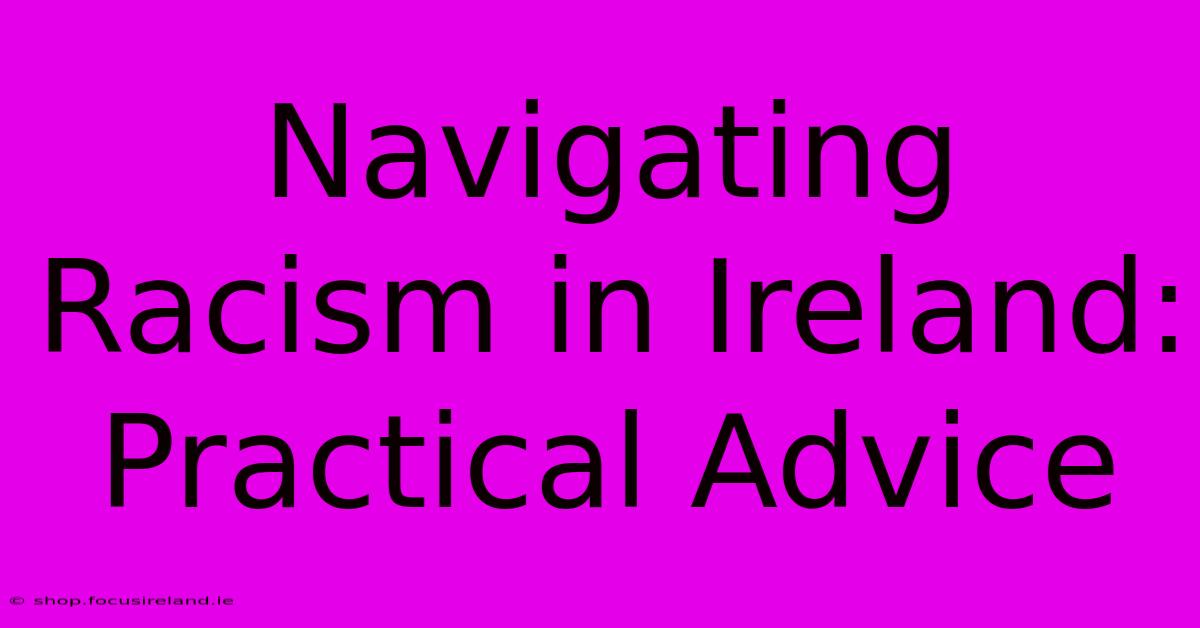Navigating Racism In Ireland: Practical Advice

Table of Contents
Navigating Racism in Ireland: Practical Advice
Ireland, like many nations, is grappling with its history and present reality regarding racism and discrimination. While often perceived as a welcoming and tolerant nation, people of color and minority ethnic groups unfortunately still face prejudice and discrimination. This article offers practical advice for navigating these challenges and building a more inclusive society.
Understanding the Landscape of Racism in Ireland
Before offering solutions, it's crucial to acknowledge the multifaceted nature of racism in Ireland. It isn't always overt; subtle biases and microaggressions are common. This can manifest in:
- Institutional racism: Systemic inequalities within institutions like housing, employment, and the justice system.
- Everyday racism: Microaggressions, subtle slights, and unintentional biases in daily interactions.
- Online racism: Hate speech and discriminatory comments on social media platforms.
- Xenophobia: Prejudice or fear directed towards foreigners or immigrants.
Practical Advice for Individuals Experiencing Racism
1. Documenting Incidents: Keeping a record of racist incidents, including dates, times, locations, and details of what happened, can be crucial. This documentation can be invaluable if you choose to pursue formal complaints or legal action.
2. Seeking Support Networks: Connecting with support groups, community organizations, and anti-racism initiatives in Ireland is vital. These groups provide a safe space to share experiences, gain advice, and build solidarity. Several organizations offer support and resources specifically for people of color in Ireland. Researching and connecting with these groups is a powerful first step.
3. Reporting Hate Crimes: If you've experienced a hate crime, report it to the Gardaí (Irish police). They are obligated to investigate and take action against hate crimes. Remember, reporting is crucial for building a record of racist incidents and prompting authorities to address the issue.
4. Utilizing Legal Resources: If you've suffered discrimination in employment, housing, or other areas, legal avenues may be available to you. Research relevant laws and consider seeking legal advice from organizations specializing in discrimination cases.
5. Educating Others: While it's not your responsibility, engaging in respectful conversations about racism can help educate others. This doesn't mean you have to bear the burden of educating everyone you encounter, but calmly correcting misconceptions or pointing out biased behavior can make a difference.
Practical Advice for Allies
1. Actively Listen and Learn: Listen empathetically to the experiences of people of color without interrupting or minimizing their concerns. Actively seek out diverse perspectives and resources to broaden your understanding of racism in Ireland.
2. Challenge Racism When You See It: Bystander intervention is crucial. This doesn’t necessarily mean confronting someone aggressively, but it might involve speaking up calmly and respectfully against racist jokes, comments, or actions.
3. Support Anti-Racism Organizations: Donate to or volunteer with organizations actively working to combat racism in Ireland. Your support contributes to their vital work and helps amplify their message.
4. Educate Yourself: Continuously learn about the history of racism in Ireland, systemic inequalities, and the experiences of minority ethnic groups. This ongoing self-education is a critical component of allyship.
5. Advocate for Policy Change: Support policies and initiatives that promote equality, diversity, and inclusion. Write to your elected officials, participate in peaceful protests, and advocate for meaningful change.
Building a More Inclusive Ireland
Navigating racism in Ireland requires collective action. While individual efforts are crucial, systemic change demands a broader approach. By working together, we can create a more inclusive and equitable society where everyone feels safe, respected, and valued, regardless of their ethnicity or background. This includes holding individuals and institutions accountable for their actions and working towards dismantling systemic racism. The journey towards true equality requires ongoing commitment and persistent effort from all members of society.

Thank you for visiting our website wich cover about Navigating Racism In Ireland: Practical Advice. We hope the information provided has been useful to you. Feel free to contact us if you have any questions or need further assistance. See you next time and dont miss to bookmark.
Featured Posts
-
Galway Apartments Close To Galway Cathedral
Apr 06, 2025
-
Ireland In August Pack For Both City And Coast
Apr 06, 2025
-
6 Days Of Irish Hospitality A Warm Welcome
Apr 06, 2025
-
Unwind And Explore Self Drive Ireland And Scotland 2024
Apr 06, 2025
-
England And Ireland A Photographers Paradise
Apr 06, 2025
